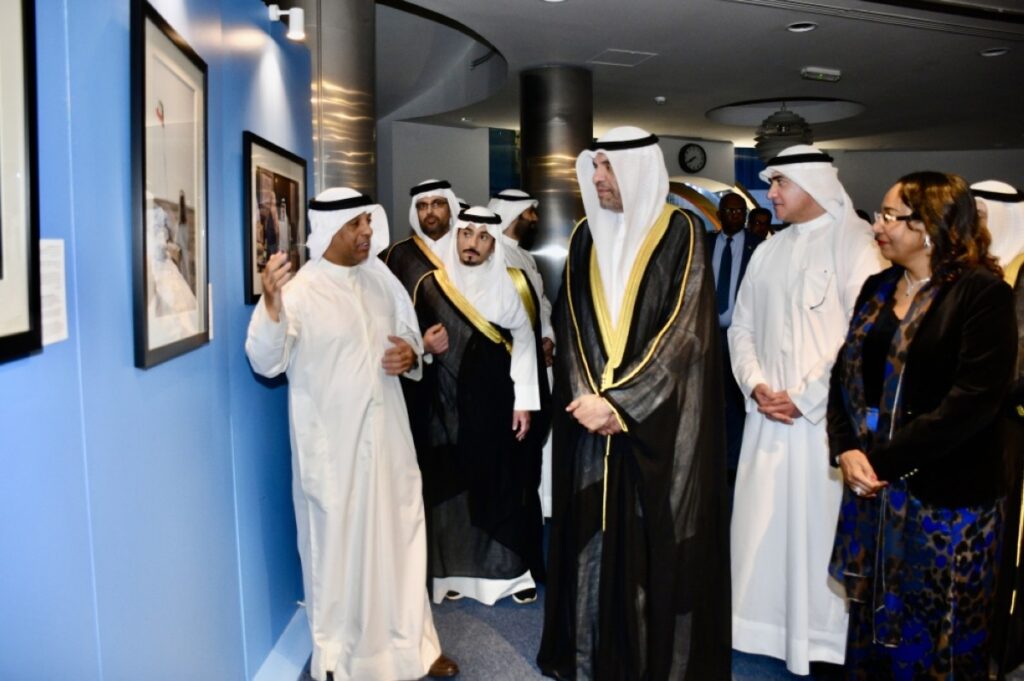Kuwait’s foreign minister reaffirms commitment to UN charter on its 80th anniversary
KUWAIT: Kuwait’s UN House, a hub hosting over 20 United Nations agencies, organizations, and programs, exemplifies the country’s decades-long partnership with the UN and its steadfast commitment to multilateral cooperation. Abdullah Ali Al-Yahya, Minister of Foreign Affairs of the State of Kuwait, highlighted the milestone during an event on Thursday marking the 80th anniversary of the United Nations’ establishment.
“The UN has remained dedicated to performing its noble mission eight decades after its founding,” Al-Yahya said, praising the organization as “a solid foundation for an international order built on justice, peace, and cooperation among states and peoples, in pursuit of our shared goals and to strengthen enduring and effective partnerships among diverse international actors.” Al-Yahya pointed to The UN House as a concrete symbol of Kuwait’s partnership with the organization. “This hub exemplifies the depth of relations between Kuwait and the UN and underscores our steadfast commitment to supporting UN work across humanitarian, developmental, and diplomatic domains,” he said.
United Nations Resident Coordinator in Kuwait, Ghada Hatim Eltahir, highlighted Kuwait’s active role over the past year, including the Universal Periodic Review, visits by the Special Rapporteur on Violence Against Women and Girls, and the Independent Expert on Foreign Debt. Kuwait also hosted the High-Level Conference on Strengthening International Counter-Terrorism Cooperation under the Dushanbe Process, launched the Global Humanitarian Overview 2025, and organized the Sixth Arab Regional Platform for Disaster Risk Reduction.

Abdullah Ali Al-Yahya, Minister of Foreign Affairs of the State of Kuwait during his speech at the event.

Eltahir presenting a gift from the UN to the minister.

Ghada Hatim Eltahir
The UN Country Team and Kuwait have collaborated on a wide range of initiatives, from the Human Development Report and the new national integrity and anti-corruption strategy to sustainable finance and Environmental, Social, and Governance (ESG) practices. Partnering with the Kuwait Fund for Arab Economic Development, Kuwait continues to extend humanitarian support to refugees and displaced persons worldwide. Joint efforts have strengthened labor mobility frameworks, enhanced counter-trafficking measures, and combated transnational organized crime. Kuwait and the UN have also worked closely on the new national health strategy, disease surveillance, emergency preparedness, youth empowerment, women, peace and security, and the social integration of persons with disabilities.
“Since joining the UN in 1963, Kuwait has actively supported the organization’s programs, funds, and specialized agencies, reflecting its dedication to strengthening the three pillars of the United Nations: maintaining international peace and security, achieving the Sustainable Development Goals (SDGs), and protecting human rights,” Al-Yahya said. Looking ahead, Eltahir noted that the signing of the Strategic Cooperation Framework will mark the next chapter of Kuwait-UN collaboration, enabling the country to contribute more effectively to the final decade of Kuwait Vision 2035 and the global push toward the 2030 Agenda for Sustainable Development.
She acknowledged global challenges including conflicts in Gaza, Sudan, Ukraine, Yemen, and the Democratic Republic of Congo, noting that such crises “cause immeasurable human suffering, displace millions, divert resources from development, and undermine collective efforts to achieve the Sustainable Development Goals.” She also highlighted rising inflation, supply chain disruptions, and inequalities as pressing challenges, alongside climate change, which she stressed as a core focus of Kuwait Vision 2035 and the Kuwait Environmental Strategy 2040. “In the spirit of UN80, we are striving to become more effective, agile, and resilient so that we can deliver on our mandates when needed the most,” Eltahir said.
At the 80th Session of the UN General Assembly, Kuwait’s delegation, led by His Highness the Crown Prince Sheikh Sabah Al-Khaled Al-Hamad Al-Sabah, reaffirmed its commitment to humanitarian assistance, peace in the region, a two-state solution, and Security Council reform. “Kuwait’s voice carries unique weight, coming from a country that understands, from its own history, how international solidarity can restore peace and sovereignty,” Eltahir added. “This belief continues to shape Kuwait’s identity today as a global humanitarian center and a beacon of multilateral cooperation, leading by example through its GCC presidency.”

